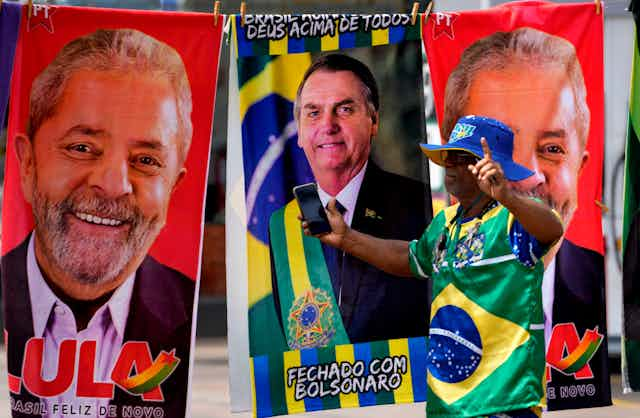Brazilians have gone to the polls to cast their ballots in the first round of the country’s presidential election. No clear winner has emerged under Brazilian electoral requirements, so there will be another round of voting on Oct. 30.
Candidates need more than 50 per cent of the popular vote to become president in Brazil. Polls predicted that Luiz Inácio Lula da Silva, the former president of Brazil known widely as Lula, would inch out incumbent right-wing president Jair Bolsonaro. But the polls were wrong, and neither candidate hit the 50 per cent threshold.
It’s unclear who will win in the second round, but one thing is obvious: Bolsonaro’s brand of right-wing conservatism is growing, and so is its threat to democracy.
The first round of votes saw a rise in strength in right-wing nationalism in Brazil. Most of the candidates supported by Bolsonaro won their races in both chambers of congress. The second round of voting will pit the two candidates’ competing ideologies against each other: one relies on hope and optimism, and the other depends on violence and threats.
Happier under Lula?
“When I was president, even you were happier,” Lula told a right-wing television presenter who questioned his motives for re-election.
This simple message seeks to make Brazilians nostalgic for a time of growth, when the country was the fifth largest economy in the world. Lula helped lift millions out of poverty, grew the Brazilian middle class and championed minorities. During Lula’s mandate, giant oil fields were discovered in Brazil, which brought an economic bonanza.
Happiness and nostalgia are Lula’s main arguments in opposing Bolsonaro. However, relying on emotions alone will not win the second round, so Lula has pivoted and broadened his political tent.

He continues to move closer to the centre to capture enough votes to win. Bolsonaro continues to double down on his nationalist approach, spread misinformation and cast doubt on the electoral system.
In 2018, Bolsonaro ran on an anti-Lula campaign. He was elected to fight growing corruption and lift up a struggling economy. He pushed nationalistic rhetoric and promoted anti-gender and anti-LGBTQ ideology, aiming to focus on supposedly traditional family values.
He mobilized a large base of devoted followers and won over skeptical voters due to the alleged corruption in left-wing parties. He also capitalized on “fake news,” spread misinformation online and cast doubt on traditional media. He was successful in polarizing the country.
Read more: How Jair Bolsonaro used ‘fake news’ to win power
A disappointment
However, Bolsonaro failed to live up to expectations during his first term. The economy continued to suffer; he could not form a strong coalition in congress and his family was riddled with scandals.
Worst of all, he botched his response to the COVID-19 pandemic, contributing to the deaths of more than 680,000 Brazilians. This is a major part of his legacy, and failing to win in the first round shows that many voters aren’t forgiving him.
In Brazil, experts say that in the first round, the electorate chooses the candidate they want, and in the second round, they reject the one they do not want.
This concerns Bolsonaro’s strategists as polls indicated that 52 per cent of participants rejected Bolsonaro, while Lula was rejected by only 39 per cent of the electorate.

Won’t accept election results
Even if he loses, Bolsonaro has made it clear that he has no intentions of leaving quietly. Bolsonaro has rolled out a strategy for contesting and denying the election results, influenced by his supposed belief that Donald Trump won the 2020 election in the United States and inspired by the former president’s tactics.
The president sees only three possible future scenarios: “Prison, being killed or victory.”
He uses this as a rallying call and asserts that victory is the only possible outcome. He spreads conspiracies and casts doubt on the integrity of Brazil’s electronic voting system. He stokes fear by painting his opponent as an illegitimate criminal who could only win a fraudulent election.
Days before the first round, the Electoral Court intervened and labelled a Bolsonaro-fuelled conspiracy about apparent Lula connections to Brazil’s largest criminal gang as fake news.
Bolsonaro has used the court’s intervention to strengthen a narrative that there is an underlying institutional interest in denying him electoral victory.

Going further than Trump?
Polarization is rising in Brazil, and democracy is under threat. Even if Bolsonaro loses the election, he still has the support of a large chunk of the population who are not going anywhere. He also has growing support in the Congress that share his ideology.
He seems inclined even to go where Trump did not dare by simply refusing to leave and declaring himself as a leader with the support of his military and congressional allies.
Bolsonaro’s rhetoric and actions this election will be another test for Brazil’s democratic institutions, which we believe they will overcome.
His presidency has been marred by disorganization and weak coalitions. But the damage he will inflict on the country could have a lasting impact on Brazil and embolden other world leaders to follow a similar anti-democratic approach to the transition of power, threatening other democratic nations.

